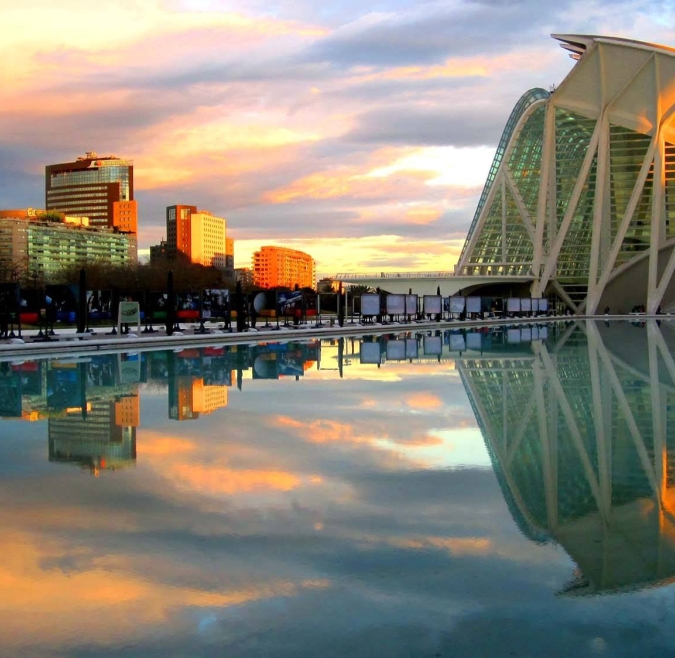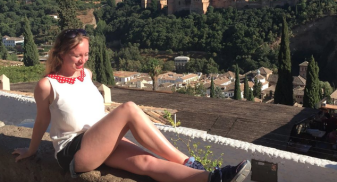University of Valencia (Spain)
The Program
This Rutgers-run program will allow you to immerse in Spain’s culture and language in one of the country’s largest cities, right by the Mediterranean Sea.
The University of Valencia is divided among three campuses and has 55,000 students. It is a major public research university, with Spanish instructed courses in nearly all academic disciplines, and high global rankings in Natural Sciences, Arts and Humanities. Students will have the opportunity to explore Spain during their preliminary academic program, which will include several multi-day field trips.
Program Locations

Spain
Valencia
Spain's third-largest city, Valencia is a top destination for university exchange students. The city is famous throughout Spain, and beyond, for its Mediterranean climate, paella, ancient monuments and festivals. This last is most evident in the March festival of Las Fallas, when satirical sculptures are erected throughout the city, only to be burned on the night of March 19. Like neighboring Catalonia, Valencia is an autonomous region with a distinct culture and even its own language. As you walk about Valencia you’ll encounter Roman ruins, a stunning medieval city center, Art Deco buildings, and a masterpiece of 21st century architecture — the "City of Arts and Sciences". Open-air cafés abound, as do designer boutiques, clubs, and endless opportunities to enjoy art, theater, music, beach-life, and all manner of sporting events.
Academics
Preliminary Program (all expenses paid!)
To prepare students for courses instructed at a Spanish university, students will enroll in an on-site preliminary program that will generally run one month prior to the start of the semester at the University of Valencia. During this time, students will complete a 3-credit course on the Geography and History of Spain, taught by the Resident Director, and they will also begin the mandatory 3-credit Grammar Workshop, taught by a University of Valencia professor.
The Geography/History of Spain is an introduction to Spanish history, geography, art and architecture. The course examines the development of Spain’s multicultural identity with attention drawn to developments extending from pre-Roman times through the Moorish occupation to the 21st century. Classroom instruction is complemented with visits to sites and museums in and around such cities like Valencia, Barcelona, Madrid, Granada, Cordoba, and Seville. Please click here to view a sample syllabus.
Please Note: This preliminary program will run only if a minimum number of students enroll.
The Grammar Workshop will assist students in the development of reading and writing skills, and oral fluency. Emphasis is on grammatical structures, idiomatic expressions and language use, as well as on subtle differences in meaning caused by changes in verb forms, prepositions, articles, etc. This course will last throughout the semester and serves as a support class for students.
Courses & Credits
In order to have an idea of what classes are available, you should visit the University of Valencia website. To help you navigate through this website, view the flowchart located here.
You can also access faculty course schedules (horarios) from the Portal del Alumno and then the process is the same as that described the flowchart above. When looking for courses, be sure that you are looking at courses for undergraduate students only and that you are looking at classes in the correct term of study.
Note: Not all departments have uploaded their schedules; upon arrival you may have to go to the actual building and buy it in printed form at the fotocopiadora.
You will need to be sure that you are registered as a full time student according to the University of Valencia and Rutgers University. That means you will need to take at least 24-30 ECTS credits (12-15 RU credits) each semester. Thus, most students take two to three classes their first semester (in addition to the History and Grammar classes) and four to five classes their second term at the University of Valencia. It is not possible to take classes as not-for-credit or pass/fail.
Internship Opportunities for Academic Year students
Some internships are credit-bearing, others are non-credit bearing.
For information about Study Abroad credit transfer, registration, and transcripts please visit the Academics section of our website.
Excursions
During your program, you will also have several group excursions designed to help you become more familiar with your host city and the surrounding region. Some of these excursions are part of your 3-credit preliminary geography and history class. The excursion may change slightly from year to year.
Past excursions have included:
- Picnic in Xàtiva
- Paella workshop at the residence hall
- Walking tours of historic Valencia
- Madrid -- to explore Imperial Spain and visit some of the world's finest museums
- Barcelona -- to learn about Mediterranean Spain from the Romans to Gaudí and Picasso
- Andalusia -- to experience the time of Muslim Spain.
- Fallas tour with hot chocolate and churros
- Thanksgiving dinner at Resident Director’s house
- Tree-trimming party at Resident Director’s house
More details about the excursions will be provided by your resident director after your acceptance.
Housing and Meals
Students will be housed in private residence halls at the Colegio Mayor Ausias March. You will share your bedroom with another student, usually another Rutgers participant, or possibly a Spanish student. Some rooms in your residence hall are suite-style and the residents in the other bedrooms of your suite, who will also share a bathroom with you, are usually Spanish students. The residence hall is a 5 -10 minute walk from the main part of campus. Please note that smoking is permitted in the residence halls in Spain.
A full meal plan is included as part of your program cost; all meals are available at the student dining hall in your residence hall. There are no kitchen facilities in the residence hall, and there are no refunds for meals not taken in the student cafeteria. If you have special dietary needs, please alert the residence hall staff and they will try their best to accommodate you.
For more information regarding Colegio Mayor Ausias March, please visit the Colegio Mayor Ausias March website. Do not directly contact or reserve housing with Colegio Mayor Ausias March, as your housing will be arranged by the program.
Financial Information
Program Costs
| NJ Residents | Non-NJ Resident | |
|---|---|---|
| ATW Program Cost* | $16,500 | $20,700 |
Program Cost includes:
• Tuition
• Housing
• Most meals
• Excursions
• Administrative Fees
• Emergency Medical Access Abroad
• *Access the World (ATW)
Out-of-Pocket Costs
| Additional Meals | $750 |
| Airfare | $1,100 |
| Local Transportation | $100 |
| Visa (Estimate is for US Citizens) | $160 |
| Books and Classroom Materials | $100 |
| Spanish Insurance (required) | $500 |
| Personal Expenses | $1,250 |
| Total | $3,960.00 |
Out-of-Pocket Cost includes:
The above costs are estimations and represent the known out-of-pocket costs students encounter during their time abroad.
Some of these expenses will be paid for prior to going abroad, such as an airline ticket and visa costs, while some of these expenses, such as meals and local transportation, will be paid in-country as part of your daily expenses. As you plan, you will need to budget these costs and spend wisely throughout your time abroad.
Program Costs
| NJ Residents | Non-NJ Resident | |
|---|---|---|
| ATW Program Cost* | $16,500 | $20,700 |
Program Cost includes:
• Tuition
• Housing
• Most meals
• Excursions
• Administrative Fees
• Emergency Medical Access Abroad
• *Access the World (ATW)
Out-of-Pocket Costs
| Additional Meals | $750 |
| Airfare | $1,100 |
| Local Transportation | $100 |
| Visa (Estimate is for US Citizens) | $160 |
| Books and Classroom Materials | $100 |
| Spanish Insurance (required) | $500 |
| Personal Expenses | $1,250 |
| Total | $3,960.00 |
Out-of-Pocket Cost includes:
The above costs are estimations and represent the known out-of-pocket costs students encounter during their time abroad.
Some of these expenses will be paid for prior to going abroad, such as an airline ticket and visa costs, while some of these expenses, such as meals and local transportation, will be paid in-country as part of your daily expenses. As you plan, you will need to budget these costs and spend wisely throughout your time abroad.


